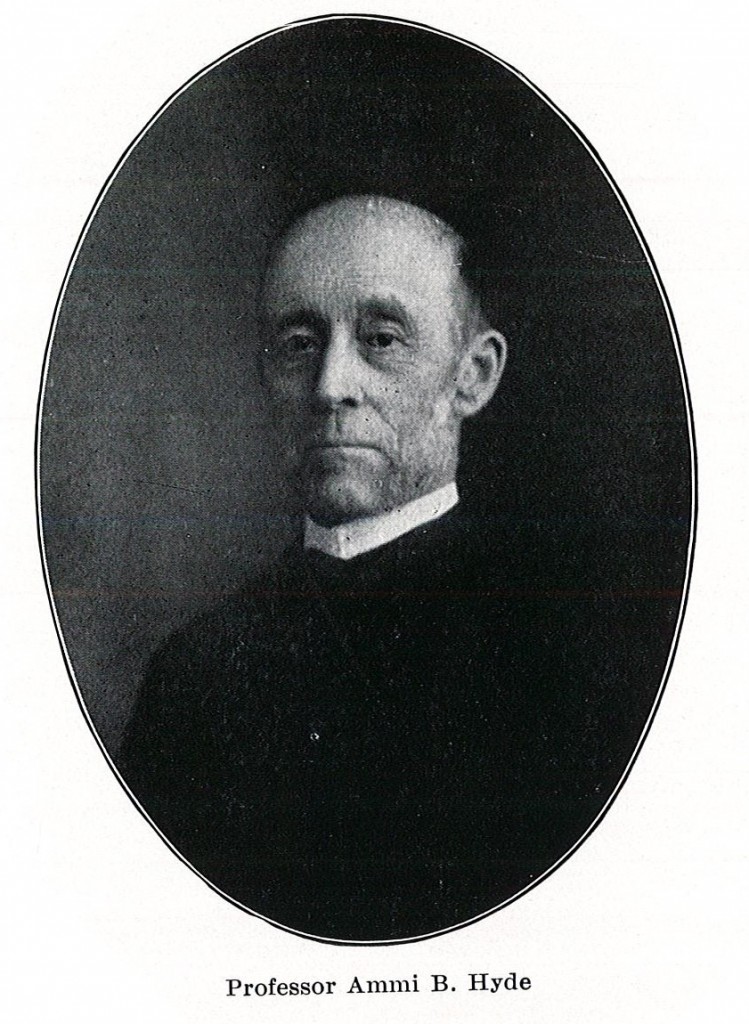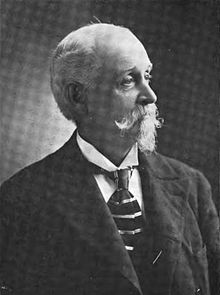Officially, the English Department at Allegheny College was established in 1893. However, English as an academic discipline started taking root years before.

In the 1860s, before there was an English Department, let alone English professors, Sophomore students who were enrolled in “The Classical” or “The Biblical” departments would study a single “History of English Literature” course throughout their entire college career. This is because Greek, Latin, and Hebrew language and literature courses were considered essential for an educated person at the time, while English language and literature was not considered a serious course of study.


Around 1877, those thoughts surrounding English language and literature would change at Allegheny. In the catalog for that year, a single entry on the importance of English as an academic discipline is recorded. “The Study of English.: A hopeful growing interest in the broad and critical study of English is recognized. To encourage this, careful instruction is given, embarrassing the processes and results of Modern Philology.”
According to Ernest A. Smith, author of Allegheny- A Century of Education, it was this same year (1877) that the first-ever English professor served at Allegheny College. Reverend Ammi B. Hyde taught English at Allegheny from 1877 until 1880 (Smith 364). However, Hyde is not mentioned as a Professor of English in the 1877 Allegheny Catalogs, and according to the catalog, Allegheny only started thinking about implementing English as a course of study. Furthermore, Hyde carries the title of Professor of English in the 1883 Alleghenian, the early name of the college yearbook. Interestingly, Hyde was not originally hired as an English professor but rather as a Greek Language and Literature professor in 1864. Professor Hyde also helped organize a woman’s school in Meadville with Jeremiah Tingley, a Professor of natural science at Allegheny (1863-1886), before coeducation existed at Allegheny (Smith 362).
During the year after Hyde’s retirement, 1884-1885, the current president of the college, President David H. Wheeler, became the sole English Professor. He taught English courses at the school until 1893, the same year Allegheny College established the “English Language and Literature” department, making it seem as if Wheeler had a serious hand in establishing the department at the college.

However, though the “English Language and Literature” department was established, students still could not receive their BA in English. They could only supplement their classical and scientific studies with English literature.

After President Wheeler, President William H. Crawford took over as the sole English professor during the 1893-1894 school year. However, after his inaugural year, President Crawford dropped the title of English Literature professor and instead became Professor of Philosophy and Christian Evidence. Though he dropped his original title, English courses were not forgotten; for in 1895, a fourth course of study was added to the catalog: “The Course in English and Modern Languages.” Students attending Allegheny from here on out could receive their bachelors in English and Modern Languages.
A succession of professors of English Literature followed President Crawford, including Clarence F. Ross (1895-1896), Florence Mann (1896-1898), and Harry Munroe (1899-1902). It was not until 1903 that Allegheny hired a English professor who stayed and made a significant difference to the department: Frank Cummins Lockwood (1903-1916).
During his time at Allegheny, Frank C. Lockwood not only encouraged the college to become seriously interested in literary, oratorical, and journalistic studies, but he also was extremely involved in the campus and with student life. He was frequently mentioned in The Campus, the student newspaper, giving lectures, publishing books, attending Quill Meetings (a literary student club), or he was writing an article for The Campus himself.

According to John B. Harte, the author who wrote a short
bibliography on Lockwood in the form of an article in the journal Arizona and the West, while in Meadville, Lockwood became something of a leader for the temperance movement and would even preach at Anti-Saloon meetings (111). After leaving Allegheny in 1916, Lockwood moved to Arizona and became the Professor of English at the University of Arizona and began working tirelessly to preserve Arizona’s history. He wrote a letter to Allegheny’s very famous journalist alumna Ida M. Tarbell, about visiting him when she took a trip out to Arizona and gave her his book Tucson: The Old Pueblo to help her “get ready to stay in town-though it has little to say about modern Tucson.” For more information on Lockwood, see John Bret’s article.
More History Coming Soon!
Department Publications and Organizations
The Allegheny Review (1983-Present)

The Allegheny Review is one of America’s few nationwide literary magazines dedicated exclusively to undergraduate works of poetry, fiction, and nonfiction. Students from all over the nation have the option to submit their prose and hope to have it selected for publication. The editorial board is made up of Allegheny students who edit each issue of the magazine, with help from a English faculty adviser. After the student literary pieces have been selected, awards in poetry and prose are given by outside judges each year. One issue is published per school year.

Famous authors have whose work were first published in The Allegheny Review as undergraduates have included: David Foster Wallace, Ander Monson, Joel Brouwer, John Poch, A. Manette Ansay, Ben Marcus, and Victoria Chang.
Film Criticism (1976-Present)

In 1976 the inaugural issue of Film Criticism was published in Edinboro, Pennsylvania. It would not be until 1984 that Allegheny would take over its publication. Lloyd Michaels, an English professor who taught at Allegheny from 1972-2014, practically began the journal being that he was head editor since Film Criticism’s third publication. When Michaels retired, he passed the journal off to the Communication Art Department at Allegheny where it continues to publish new editions. However, the new online editions will be online editions rather than physical prints. The last physical edition of Film Criticism is Vol. XXXIX, No. 3 from the spring of 2015. See Lloyd Michael’s last editor’s note, and Joe Tompkins’s, the new editor, Incoming editor’s note, in the final print copy of Film Criticism here.
Film Criticism is the third oldest academic film journal in the United States, and prides itself on presenting work from new generations of film scholars and thus representing multiple critical, cultural and theoretical perspectives. To learn more, visit the website: https://filmcriticism.allegheny.edu/
The Single Voice Reading Series (1980s-Present)
Established in the early 1980s, The Single Voice Reading Series provides students with an opportunity to hear and meet nationally known writers. Readers have included John Updike, Carolyn Forché, Tobias Wolff, W.D. Snodgrass, Robert Olen Butler, Tim O’Brien, and Mark Doty.

References
- Harte, John B. “Frank C. Lockwood: Historian of the Southwest.” Arizona and the West 9.2 (1967): 109-130.
- Smith, Ernest A. Allegheny- A Century of Education: 1815-1915. Meadville, PA: The Allegheny College History Company, 1916.